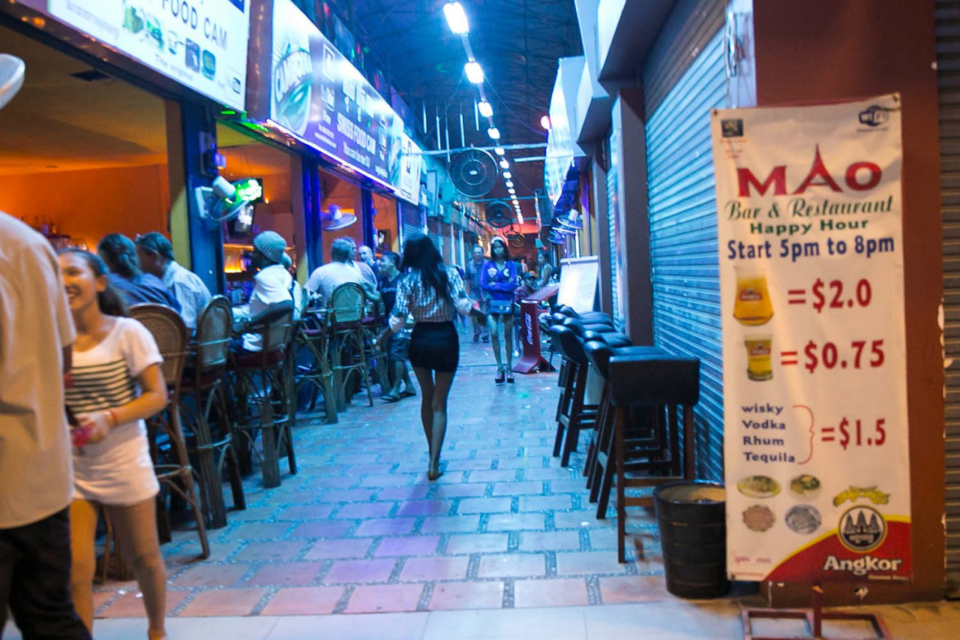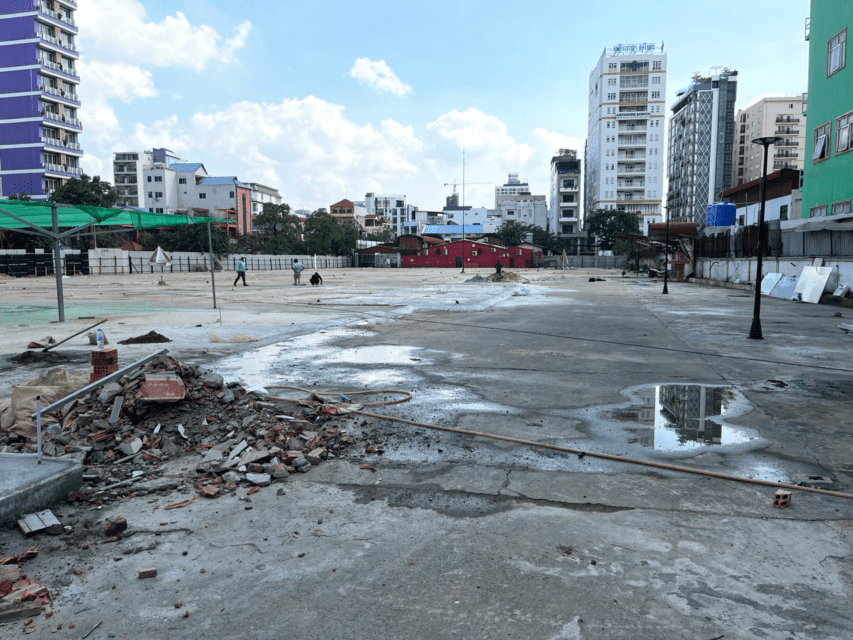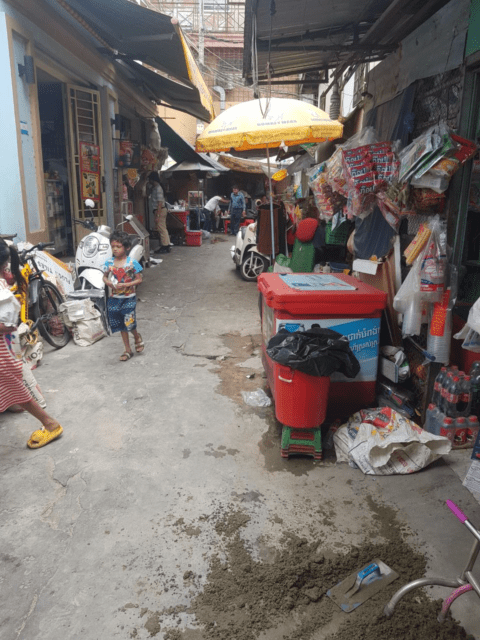The Golden Sorya Mall, which billed itself as Phnom Penh’s Pub Street, has finally been taken down after a decade of being a famous part of the seedier side of the city’s nightlife.
Some see a welcome cleaning up of the area, though others rue the loss of opportunities. Nearby, residents of a cluster of narrow alleyways have become wary — and increasingly vigilant — that the crime associated with the notorious compound has shifted closer to their homes.
The Golden Sorya Mall was a semi-open area which included many different venues for small businesses, sharing a wall with the famous “Pontoon” Nightclub. When it first opened at the end of 2009, it featured 178 different venues, and was envisioned as a more modern take on the traditional Phnom Penh market, consisting of small clothing outlets and street food vendors.
However, over time it became known for prostitution, drugs, and cheap alcohol. A substantial portion of its patrons were older foreigners from Western countries, both immigrants and tourists.
In 2018, the owners made an effort to reinvigorate the location while embracing it as a party spot, putting up a sign which read “P.P. Pub Street” and adding modernly designed duplex bars. While a few new pubs and food vendors set up shop, it wasn’t enough to save its reputation, and it continued to descend into squalor, until it was fenced off in mid-October. Today it is going through the final stages of deconstruction.

The area of the former mall will soon be reopened as a large parking lot for the next two years, until the contract for Pontoon Nightclub expires, at which point the whole block will be redeveloped, according to information provided by a hotline number at the construction site.
It is still unclear what form this future development will take, though workers at the lot said they were told it would be in the food and beverage industry. The chairman of the Golden Sorya Corporation, Van Ieng Sou, said over the phone that he did not know who the land was sold to, as the sale had gone through an agent. The phone operator at the hotline told reporters she could not answer questions about which company or person controls the property now, because her boss was out of the country.
The removal of the Golden Sorya Mall reflects a general trend in the area just south of Central Market and other pockets of Phnom Penh once famous for sex tourism. Many of the “hostess bars” in the neighborhood have also shut their doors in the last few years.
“In the last five years, everything has changed,” said San Leang “Corey” Seng, the owner of Blue Pub, half a block down Street 51 from Golden Sorya. The unit he now rents was once a hostess bar called Honey Love Bar, before being turned into a convenience store, then a coffee shop, which he bought and turned into a live music pub. He explained that the famous hostess bars, where women in suggestive clothing stand outside beckoning male customers, are no longer viable business models as employment opportunities expanded. “If they didn’t really need the money, they would not be doing that job,” he said, explaining that this brought in conflict, crime and other problems. This leads to customers feeling unsafe, and eventually not coming. Madames from the few remaining hostess bars on the street, none of whom agreed to be named, said that business had been dwindling for years even before the Covid-19 pandemic, and was quickly becoming unsustainable.

“It’s good that they closed it,” said Ann Phanhi, who sells snacks and drinks directly across from the fence around the now unused lot of Golden Sorya Mall. He said that while he has lost a portion of his customers, he felt that overall it improved the neighborhood. He said that over the years he had seen slashings and other gang violence, and even chose to intervene once to rescue a customer who was being beaten.
Others were not as happy to see it go. Sokkheang, a sex worker who worked inside of Golden Sorya for three years until it closed, said that it has been extremely hard on her and other workers. When she first started working in the mall, she was able to make $30-$40 dollars a night. Over time, her income gradually decreased until she was making around $10-$20. She said that as income went down, many of the other women working in and around the mall stopped being able to afford treatment for HIV/AIDS, which is very common among them, and people she knew died. Poor families should be eligible for free HIV treatment under IDPoor, but many are not aware of the governmental welfare program or do not have enough documentation.
Now that the mall is closed, things have become much harder. “I have no money, no home,” She said. “I pay someone 500 riel to take a shower.” While a few hostess bars are still open, she said that none of them would take her in, and because she and most of the other sex workers from Golden Sorya come from rural communities and have no formal identification cards, it is extremely difficult to find other work.
The lot is a prime piece of real estate, being over 9,000 square meters in Daun Penh, where land generally sells for around $4,000 per square meter, according to publicly available listings. However, this estimate does not factor in the property’s major geographical assets, having road access on all four sides and being walking distance from Central Market or Vattanac Tower. This means that the property is likely worth more than $40 million — a figure roughly corroborated by realtors who declined to be named.
Some business owners are also struggling, with some saying they were given only one month’s notice that their contracts would not be renewed.
“It was very difficult for me,” said a former manager who declined to be named. She said that renewing the contract with Golden Sorya had always been difficult, as the rental price always went up even as the foot traffic went down. “They didn’t care if we could pay. If you could rent: Rent. If you can’t: Go away.” She said that when the end approached, the company did not inform any of them officially that their contracts would not be renewed, but that they had heard rumors that it might be the case. She moved her business to a new location around the corner, and though many of her customers followed her, she is paying even higher rent while making less income.
She said that some hoped that the closure of the mall would reduce gang violence and drug abuse in the area, and noted that the police presence in the surrounding area has markedly increased. When she was interviewed last week, she said that just the previous night she had seen several people get taken by police into one vehicle, apparently in connection to drugs.
“Of course, we want to clean the area,” said Svey Son, the village chief of the area on the south side of the mall. He said he is working with the commune chief to bring homeless people in the area to a shelter and drug correction center, but says it is difficult to clean the street because they can only get one or two at a time. He stressed that he does not act aggressively toward them, and sometimes gives money to people who need it. He said that going to the centers enables them to learn mechanical and technical skills that might keep them off the streets.
Nearby residents were skeptical that this would make a big difference, and speculated that the drug dealers had not become fewer, but were simply being pushed off the main streets.
Residents of “Phum Dap” (Village 10), a collection of unmapped narrow alleyways and cramped buildings boxed in by streets 51, 172, and the headquarters of the Anti-Corruption Unit, have complained that crime has suddenly moved into their already neglected area of the city. Inside this maze of alleyways practically invisible to people walking along the perimeter, heavily tattooed drug dealers sell methamphetamines in the open. Residents warned reporters it was dangerous to enter.
Lou Mong Huot, the village chief of Phum Dap, said that he is organizing the local residents to defend themselves from criminals using sticks. “We have the right to self defense,” he said. “if we wait for the police to arrive… the police only show up to dead bodies. That’s all they can do; the citizens have already died. How can you help them in time? So as a leader of this village, I have to teach my citizens to protect themselves.”
He also said that many of the people sent to the correctional centers jump over the fence and run away. He explained that as only a local politician, he has little influence over it, but said he wouldn’t know what to do about them anyway, and neither do the higher ups. He only hopes that the land gets developed into a large facility which can offer jobs to the people in his village. In the meantime, he said there is not much they can do about incursions into the village by criminals.


“It wasn’t like this before,” said Nhean Yun, who has been living inside Phum Dap for 34 years, and runs a small hair salon nestled behind an international school. She reported that most of the criminality outside her storefront appeared only after Golden Sorya was closed. Since then, she said, fights and altercations have become daily occurrences, but the people responsible are not from the neighborhood.
“Where do you even live?” she sometimes shouted when they played loud music in the alleyway, she said. Sometimes her shouting causes them to disperse or turn down their music, but they always come back.












